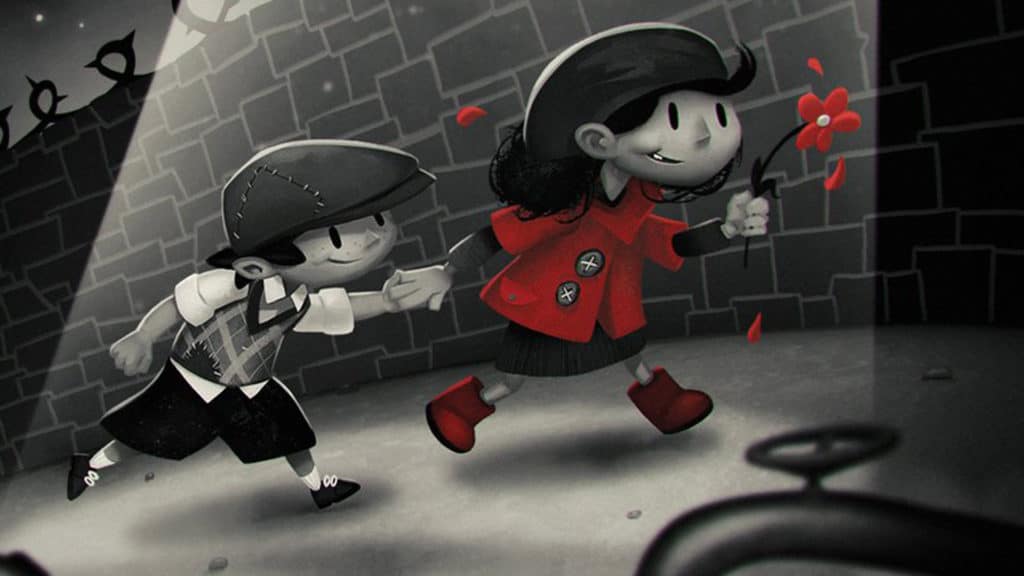Video Gamer is reader-supported. When you buy through links on our site, we may earn an affiliate commission. Prices subject to change. Learn more
Bonds can form at the most volatile times. The little boy and girl in 2D adventure puzzler My Memory of Us are an example of this, as they’re focussed on adventure and play, while the harsh reality of their monochromatic surroundings begins to fill with splashes of crimson that divide the locals into two groups. You don’t expect games that are heavily based on The Holocaust to depict more hope than atrocity, but that’s what developer Juggler Games has chosen to do with this, crafting a fairytale about friendship rather than a nightmarish re-telling of what is arguably history’s greatest horror.
Each chapter of this cartoon-stylised tale begins with a charming sequence narrated by the great Patrick Stewart. With a suitably gentle delivery, his reading evokes feelings of a bedtime story with an impossibly sweet message: The Evil King and his steampunk robot army are here to take over, segregating by colouring the inferior with a Schindler’s List red, but these kids will fight for each other until the bitter end, refusing to be separated by the nazi stand-ins. The barbarity of war takes a backseat to the innocence of childhood; MMoU walks the saccharine fine line quite well, often falling down more on the niceness of a couple of kids who just want to play, without going too overboard.
I feel like the studio might have wanted to *say more* because you discover some completely avoidable collectibles dotted about that will educate on some Polish notables of the Second World War. It’s a difficult one: a lot of the characters within are based on actual figures from World War II, but the trials they face here are presented in the form of an endearing animated short from Disney’s Pre-Golden Age. This dichotomy initially jars, but soon subsides as terrors of war play second fiddle to a lovely, simple story of companionship. With Stewart’s expert oration, it’s quite easy to get lost in this uplifting narrative and take it for what it is: an account of optimism.

Each level sees you picking up items of interest for characters in exchange for passage, as well as solving puzzles by grabbing that doohickey and taking it over here, or dragging that thingamabob over there – usual adventure game fare, and logical enough. Each child has abilities that cater for different occasions: the boy is good at sneaking and can hide in a variety of nooks, while the girl is stronger and able to run much faster than her pal. You can switch between both at any time, controlling them independently of the other, or linking them together by holding hands. The leading child’s ability becomes the dominant one, and that connection is only broken when their teeny-tiny mitts unclasp. It’s a nice idea, showing how working together is the best course of action, but in execution, it’s fiddly and frustrating. Most of the time it’s difficult to tell if the kids have actually agreed to lock palms after your input, and in particular circumstances where it’s vital to act fast, it’s not exactly ideal. This is where that pleasant feeling you had a moment ago is lost in favour of irritation.
While the grab-this-thing-and-bring-it-to-this-person-to-open-that-door puzzles seldom smash your brain into bits, there are things like door unlock codes that test your perceptive powers, requiring you to go the extra mile to notice certain things in the environment, and some mini games that do similar, breaking up the action. These little distractions rarely repeat, too, posing a relatively exciting new challenge every time one is introduced. Once you’ve worked out the first dice clock, you’ll be able to work out all future dice clocks, but hey, at least they’re different to the dancing rhythm game and the Pipe Mania bamboozlers.
Creating a game based on The Holocaust and deciding to make it the backdrop to your story rather than the focus is a bold move, but one that pays off more than it doesn’t in My Memory of Us. Granted, the mechanical soldiers flirt with the absurd, which grates with the tone at times, but that’s always followed by tender moments of compassion between the two besties. The duo’s reluctance to always follow your orders is annoying and quickly makes you go from ‘awww’ to ‘argh’, but cumbersome kids don’t stop this from being a sweet take on the unbreakable bond.
Developer: Juggler Games
Publisher: IMGN.PRO
Available on: PC [reviewed on], PlayStation 4, Xbox One, Nintendo Switch
Release date: October 9, 2018
To check what a review score means from us, click here.
